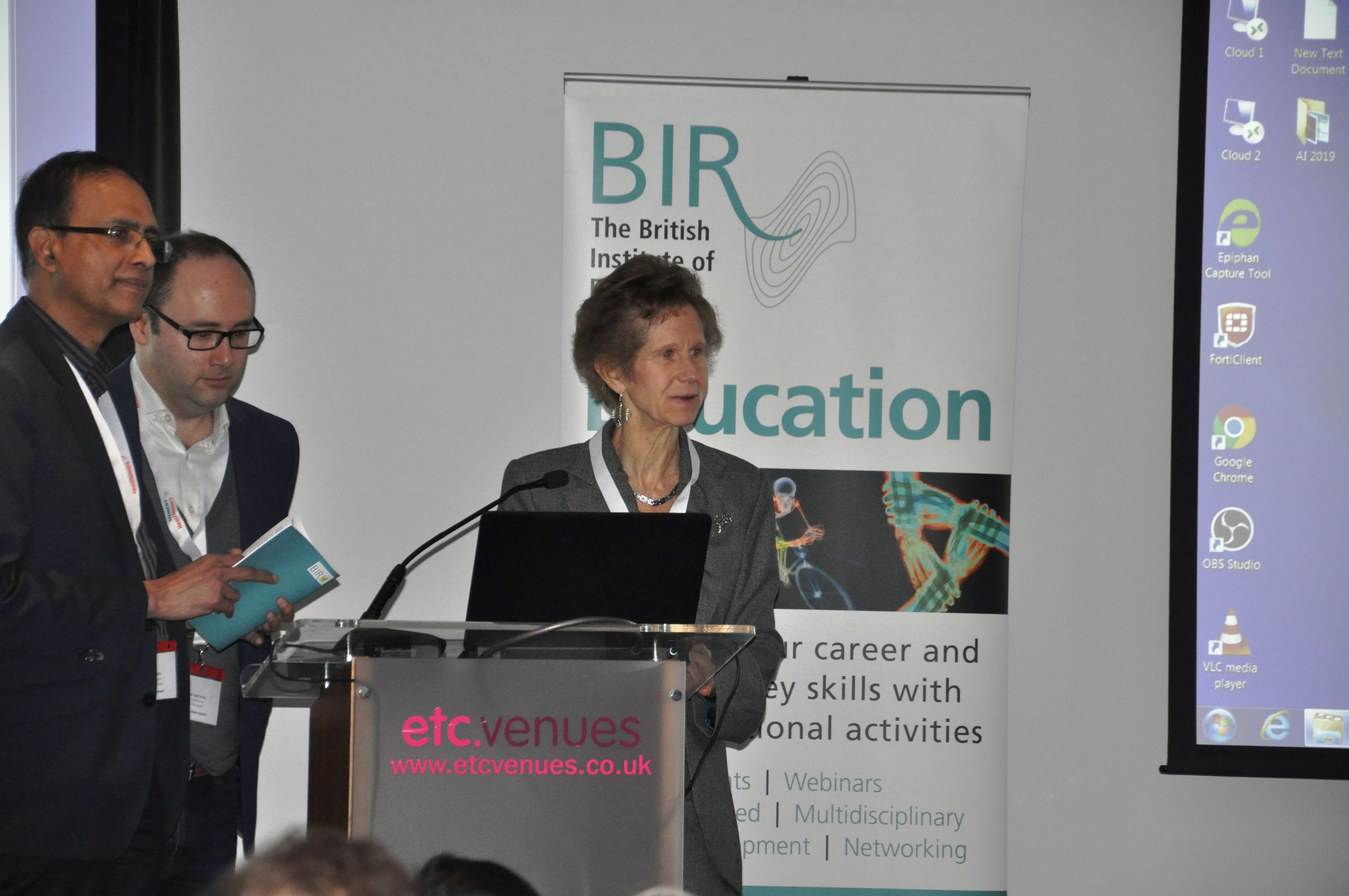
There was a positive vibe at this one-day meeting on Artificial Intelligence which concluded with a lively debate about privacy of data, regulation, workforce training and the role of clinical trials. Organised by The British Institute of Radiology (BIR) jointly with The Royal College of Radiologists (RCR), the meeting reflected the rapidly changing environment of artificial intelligence (AI). There was a distinguished panel of UK and international invited speakers and five proffered papers from medical physicists, clinical scientists, doctors training in radiology and non-radiology trainees.

Dr Nicola Strickland (image, left), President of the RCR, emphasised that although significant achievements had been made in picking the “low hanging fruit” to develop AI in radiology, the results produced by various organisations developing AI for radiology needed robust validation. She also expressed concerns about regulation for AI applications in radiology, particularly given the growing enthusiasm for adopting AI in a specialty experiencing workforce shortages at all levels.
Dr Hugh Harvey, from Kheiron Medical, highlighted the value of acquiring high quality data so that machine learning algorithms could be appropriately trained without the risk of “overfitting” and acknowledged the lack of validation of AI algorithms and the general lack of randomised control trials in this field.
 Professor Derek Hill (image right), Professor of Imaging Sciences and Director of Enterprise, University College London spoke on regulation of new AI products for interpretation of radiology images. Professor Hill highlighted a “grey area” as to whether a product based on AI could be classed as a medical device.
Professor Derek Hill (image right), Professor of Imaging Sciences and Director of Enterprise, University College London spoke on regulation of new AI products for interpretation of radiology images. Professor Hill highlighted a “grey area” as to whether a product based on AI could be classed as a medical device.
Dr Kristen Yeom, Associate Professor of Radiology, Stanford University, California specialises in paediatric neuroradiology and provided fascinating examples of the practical applications of AI in her field, particularly using radiomic and machine learning strategies for paediatric brain tumour classification and using deep neural networks to assess normal brain development and aging.
Dr Navin Ramachandran, Consultant Radiologist, UCL NHS Foundation Trust provided a good insight into the ethics of applying AI not only in medicine, but also in fields outside medicine. He spoke at length on issues pertaining to privacy of data, particularly in an era where facial recognition and use of social media are becoming widespread.
 Professor Paul van Diest, Head of the Department of Pathology at the University Medical Center, Utrecht, stressed the role of AI in automating tedious and time-consuming tasks and at the same time making the diagnosis more reproducible and reliable. Professor van Diest also stressed that pathology was lagging behind radiology in implementing AI and machine learning in general, particularly because of no set standard for acquisition and distribution of digitised pathology images.
Professor Paul van Diest, Head of the Department of Pathology at the University Medical Center, Utrecht, stressed the role of AI in automating tedious and time-consuming tasks and at the same time making the diagnosis more reproducible and reliable. Professor van Diest also stressed that pathology was lagging behind radiology in implementing AI and machine learning in general, particularly because of no set standard for acquisition and distribution of digitised pathology images.
Dr Christina Messiou, Consultant Radiologist, The Royal Marsden Hospital NHS Foundation Trust spoke about using AI to support adoption of functional MRI into clinical practice. Using the example of MRI skeletal surveys for haematological malignancies, Dr Messiou highlighted the diagnostic difficulties without using AI, the barriers in adopting AI and the potential for AI in problem solving in skeletal surveys, particularly in detecting lesions that were not observed initially by the reporting radiologist.

Ending on an optimistic and positive note, the day provided a vital overview of how AI is and should be applied and flagged the areas where strong governance is required. AI is no longer perceived as a threat, but as a medium to enhance patient care with the benefits of safe and accurate diagnoses. Full implementation of AI in radiology needs extensive robust clinical validation and appropriate regulation.
Top photo: Left to right, Dr Sri Redla (Honorary Secretary, BIR), Professor Derek Hill, Dr Nicola Strickland, Dr Hugh Harvey and Dr Kristen Yeom
Some feedback from delegates on the day
"Fascinating study day on a very important topic for radiologists. I feel somewhat reassured about the threats of AI, though I feel this topic should be revisited on an annualbasis due to how rapidly the capabilities of AI are progressing."
"Really excellent overview of where AI is heading in radiology to alert radiologists to timeframes, practicalities, governance and regulation."
"A very good day. Exceeded my expectations for the event and I came away with a much better overview of where AI currently sits in relation to radiological practice."
"Very informative and insightful, it will change the way I think about radiology in the future and how to shape my own career in radiology."
Event review by:
Dr Vijay Jayaram, Consultant Radiologist, Princess Alexandra Hospital, Harlow (Chair of the BIR Clinical Intelligence and Informatics Special Interest Group)